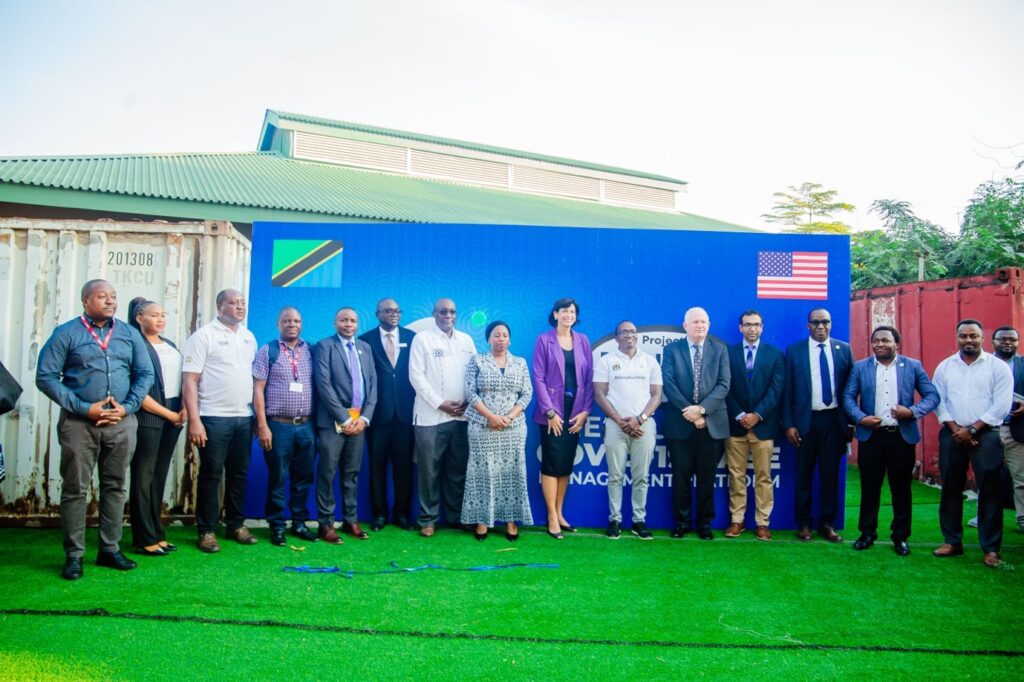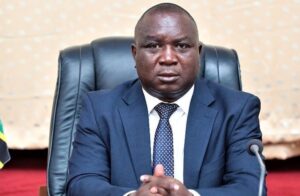The Minister for Health, Hon. Ummy Mwalimu (MP), U.S. CDC Director Rochelle P. Walensky, and U.S. Ambassador to Tanzania, Donald Wright during the inauguration of the Extension for Community Healthcare Outcomes (ECHO) Project for COVID-19 case management platform at the Muhimbili National Hospital (MNH)
Inauguration of the ECHO Project COVID-19 case management platform at the MNH would enhance health care providers’ capacity to address new drugs, investigations, and evidence-based interventions in managing COVID-19 patients.
This makes MNH the hub of medical and technical expertise to be used by all health facilities at the district, regional, zonal, and referral hospitals. In her address during the launch in Dar es Salaam last week, Minister for Health, Hon. Ummy Mwalimu said the hub will connect specialists and primary health care providers through a real-time learning model using low-cost videoconferencing technology. She remarked that participants in an ECHO session present real (anonymized) cases to specialists and other participants for discussion and recommendations.
The ECHO hub has been launched by the government in partnership with the U.S. Centers for Disease Control and Prevention (CDC), MNH and Management and Development for Health (MDH). The facility’s goal is to reach all healthcare workers, including clinicians, nurses, microbiologists, nutritionists, physiotherapists, social workers, biomedical engineers, and all other carders, who are involved in patient care within the health sector.
“Since its introduction in Tanzania in 2016, the ECHO project which had only eight sites connected has so far expanded and there are now eight hubs at hospitals connecting 272 health facilities (also known as spokes) in both mainland and Zanzibar.
She added: “We have achieved enough through our partnership with CDC whereas we have been able to reduce HIV infection and establishment of one national emergency operation center (EOC). CDC is also supporting ongoing COVID-19 vaccination services. Until yesterday, we have vaccinated 12.8 million people, equivalent to 41.3 percent of reaching the country’s target to vaccinate 70 percent of the targeted population by December this year”.
Mwalimu noted that through the CDC support, the government has been able to improve laboratory services, which include the facilitation of nearly 44 laboratories to get international standards accreditation and providing training to over 500 laboratory technicians.
ECHO is distinguished by its continuous loop of learning, mentoring, and peer support which has a far-reaching impact beyond that of a webinar, e-learning course, or telemedicine care. The program will provide uniformity and learning among practitioners in the management of COVID-19, said Mwalimu.
Speaking during the inauguration, The CDC Director, Rochelle Walensky acknowledged the Government of Tanzania for the partnership and collaboration in combating public health threats. The U.S CDC supported the development of a curriculum covering COVID-19 sessions including but not limited to infection prevention and control (IPC), diagnosis and treatment, psycho-social support for case management, and COVID-19 vaccines.

Photo: MDH’s staff supporting the ECHO clinic
Benefits of Project ECHO
- Increased clinical knowledge for health providers as real-time feedback and education is provided by experts.
- Providers stay up to date on changes in practice and guidelines as new information can be easily disseminated and implemented across the country.
- Reduced referrals to higher levels of the healthcare system and increased linkage between experts at higher levels of the health system and lower level/primary health care facilities.
- Lower training costs/spending, as well as serving time providers, can use to travel for new updates/training (as for the certification of the non-laboratory testers).
- Reduced the burden of absenteeism from health care facilities in order to access training.
The ECHO project builds the capacity to treat chronic, complex health conditions in rural and underserved communities that lack access to clinical specialists. It is geared to enhance learning for a wide range of health care providers, both educationally and geographically. Funding for the project is provided by the U.S. President’s Emergency Plan for AIDS Relief (PEPFAR).


